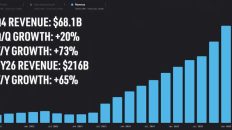Mentioned in Video:
- 💰 Outperforming Cathie Wood?! My Portfolio Revealed: https://www.youtube.com/watch?v=hlHDXh3ymgk
- ⚠️ Cathie Wood: Warning to Banks & Which Companies Will Disrupt Them (ARK Invest Big Ideas 2021): https://www.youtube.com/watch?v=VV9YNg0eGVI
- 🌏 SE Stock | ARK Invest Has $550M in Sea Limited Stock: https://www.youtube.com/watch?v=czDuE7AoWHE
- Peak Fintech Investor Relations (TNT): https://peakfintechgroup.com/investors/
- ARK Invest's Whitepaper on Cash App (SQ) vs. Venmo (PYPL): https://ark-invest.com/white-papers/cash-app-vs-venmo/
- Peak Fintech Earnings Beats Estimates (first link is to the Zacks Report): https://finance.yahoo.com/news/pkkff-peak-fintech-beats-estimates-121600587.html
- Direct Download (PDF) Link to the Peak Fintech Zacks Report: https://s27.q4cdn.com/906368049/files/News/2021/Zacks_SCR_Research_09012021_PKKFF_Thompson.pdf
- Support the channel and get extra member-only benefits by joining us on Patreon: https://www.patreon.com/tickersymbolyou
🧨 One of my favorite #ARKInvest funds is #ARKF, #CathieWood‘s Fintech Innovation Fund. Let's take a look at a Canadian #Fintech company operating in China called #PeakFintech (TNT stock) and I'll show you why I think it's a perfect fit for @ARK Invest, even though they're out of most Chinese stocks right now. I used to hold Peak Fintech Group stock when it was PKKFF in my personal portfolio and plan on buying it again because I think TNT stock is about to explode!
Video Transcript:
00:00
The idea behind this channel is simple; connect the dots between ARK Invest's market research,
00:05
stock picks, and daily trading data to highlight the best investing opportunities among companies
00:09
that are transforming our daily lives. But what if we start applying some of the technology
00:14
and economic trends ARK Invest is always talking about to stocks outside their portfolios?
00:20
Can we find stocks that would make sense for Cathie Wood to hold in ARK Invest's funds
00:23
and buy them before she does? The answer is an obvious yes. One of the things every disruptive
00:29
company has in common is that they're using advanced technologies to solve modern problems
00:34
that legacy companies aren't doing a great job solving for one reason or another. So
00:38
one thing we can do is use ARK Invest's research to find these modern problems, pick the ones
00:44
with huge total addressible markets, and see who's solving them, regardless of whether
00:48
ARK Invest holds that company or even invests in that market. Here's a good example. 17
00:54
million people in the US are underbanked or completely unbanked. About 4 and a half
00:58
percent of those are small business owners, so that's about 765,000 small businesses.
01:04
Traditional banks can't really solve that problem because they have high customer acquisition
01:09
costs thanks to all of the physical assets they need to pay for; think big buildings
01:13
in the best parts of major cities, all the staff inside them, huge networks of ATM machines,
01:19
and so on. These big banks aren't willing to go after businesses they don't think they
01:23
can make a positive return on over time, which means they can't afford to serve many of the
01:28
businesses that are currently unbanked! Pretty ironic, right? Digital banking solutions don't
01:33
have those physical assets, which means they can make a positive return on a tiny business
01:39
much quicker. Those reduced customer acquisition costs let digital banks do 2 things: spend
01:44
some money poaching smaller businesses from big banks with better offers AND acquiring
01:49
underbanked businesses with less money in the first place, since they can still earn
01:53
a profit off of them while big banks can't. This big difference in customer acquisition
01:58
costs between big banks and digital wallets is something ARK Invest really hammers on
02:02
in their research on Square, Paypal, and other digital banking solutions found in ARKF, their
02:08
Fintech Innovation Fund. Well, it turns out that unbanked businesses are a fairly small
02:12
problem in the USA, because those 765,000 underbanked businesses account for less than
02:19
2 and a half percent of all small businesses in the US. Relatively speaking, it seems that
02:22
this is a fairly solved problem, right?
02:23
Well, if you zoom out to the rest of the world, you can see that this is actually a huge problem
02:27
pretty much everywhere else, which means the market opportunity is actually enormous. Around
02:33
two thirds of Latin America and the Middle East are underbanked or unbanked completely.
02:38
Around 60 percent of Southeast Asia is unbanked. According to a study done by Google, Bain,
02:43
and Sea Limited, that number could actually be as high as 75% percent in Southeast Asia.
02:48
In Sub-saharan Africa, the number is as high as 80% percent. No one company can solve this
02:52
MASSIVE problem worldwide because the financial culture of each region is different, as are
02:57
their banking systems and regulations. A one-size-fits-all Fintech solution just doesn't make sense,
03:03
so to fully capitalize on this world-wide opportunity we need to be picking the winners,
03:08
plural, that will emerge region by region. Even though ARK Invest is out of Chinese stocks
03:13
right now, the stock I want to talk about in this episode focuses on solving this problem
03:18
for small and medium sized businesses in China in a way that the Chinese government supports.
03:24
That's important to recognize in light of the recent regulatory crackdowns. The name
03:28
of the company is Peak Fintech Group and it just uplisted to the NASDAQ in early September
03:33
with the ticker symbol T N T, which is very fitting, giving how much the stock's price
03:38
has exploded over the last 3 months. I think Peak Fintech belongs in ARKF, since it uses
03:44
advanced technology to solve societal a problem ARK Invest cares about in a market where this
03:49
problem is massive. Full disclosure, I used to hold 8100 shares of this stock with an
03:54
average cost basis of $2.82 when it was still listed on the OTC Markets and I just sold
04:00
my last share at $10.00 even. So, I currently don't own this stock but will 100% be buying
04:05
back into it when I start my $100,000 public portfolio to compete with Cathie Wood's ARKK,
04:12
which I'll talk more about at the end of the episode.
04:15
Let's dive into Peak Fintech Group, starting with the problem they're solving. Over 100
04:20
MILLION small businesses in China had a hard time getting access to credit in the last
04:25
3 years. That's 130 times more than the US number I gave you earlier and is largely attributed
04:31
to the structure of China's financial system, which is fragmented and difficult to navigate.
04:36
The first part of solving this problem is bringing the data from all of these financial
04:40
fragments together and standardizing it to make apples-to-apples decisions about how
04:44
to connect businesses who need money with lenders who have money. That's what Peak Fintech
04:50
does; it's basically Tinder between businesses and banks. But uh, without all the swiping
04:55
and creepy messages. Nevermind. Lenders want to see bank statements, government approvals,
05:00
and so on from a business, while the business wants to understand the criteria they need
05:04
to meet to get approved for a loan. Once all this data from lenders, brokers, banks, businesses,
05:11
and other data providers is all in one place and standardized, Peak Fintech uses data analytics
05:16
and artificial intelligence to match lenders and vendors. If you've been watching my channel
05:21
for a little while, you'll know I'm obsessed with this idea of frictionless value transfer,
05:26
again, an idea that Cathie Wood and ARK Invest relentlessly focus on. The basic idea of frictionless
05:32
value transfer to take an inconvenient but necessary process – like getting a loan, going
05:37
to the doctor, talking to other people (ughgh) – and make it more convenient with technology.
05:44
Here's how Peak Fintech reduces friction for the participants in their ecosystem. For Small
05:48
and Medium-Sized Enterprises, it's free to sign up and you automatically get matched
05:53
with ALL the lenders you qualify for without needing to shop around, which is often the
05:58
most difficult part of getting a loan.
06:01
Peak Fintech reduces friction on the lender side by putting the right businesses who want
06:05
the right-sized loans right in front of them based on pre-established criteria. That means
06:10
businesses win 3 different ways: they don't need to spend as much money on advertising,
06:15
they don't need to spend as much money analyzing risk, and they don't need to spend as much
06:19
time talking to businesses only to find out half way through the process that that business
06:23
doesn't qualify for the loan. That's a LOT of friction taken out of the process on both
06:28
sides and both sides should want to pay for that service. And guess what; they do want
06:35
to pay for that service. In 2018, Peak Fintech helped with over 2500 transactions and had
06:41
less than 2% percent of those loans default. In 2019, they expanded to 2 other cities and
06:46
7 exed their revenue, from $1.6 million dollars to $11.7 million dollars, and in 2020 they
06:53
acquired the Jinxiaoer loan brokerage platform, expanding their footprint to 40 thousand loan
06:58
sales reps over 31 cities, and more than tripled their annual revenue again to $42.7 million
07:06
dollars. These physical financial centers help them collaborate with the cities they're
07:10
in and foster lending activities with lenders, businesses, and government officials that
07:15
want that face-to-face interaction. But didn't I just say that physical bank branches are
07:20
bad? In my opinion, that's true here in the US but there's no one-size-fits-all banking
07:25
solution for the whole world; face-to-face interaction is an important part winning the
07:30
ability to do business from the Chinese government and city officials, not just doing business
07:36
once you've approved. It's a different system there and Peak Fintech feels they need that
07:41
physical footprint to expand their reach today, in a digital world. Peak Fintech is expanding
07:47
their reach in a few ways. The first is by partnering other service providers to help
07:52
expand the list of things they can help small businesses do. This includes partnerships
07:57
with massive distributors that work with Chinese retail giants like JD.com, which is in ARKF
08:02
and ARKQ today. These distributors have access to hundreds of thousands of stores and retail
08:08
clients. They also have a business unit that focuses on payment processing to help facilitate
08:13
the actual financial transactions between these lendors and vendors, including much
08:18
sought-after services like cash advances. Peak Fintech is also expanding to adjacent
08:23
markets, like social media influencers, which are a popular and powerful marketing tool
08:28
in the Southeast Asia region. Remember my video on Sea Limited, when I talked about
08:32
Shopee's international expansion and the importance of understanding local markets and cultures?
08:43
[JACKIE CHAN] You're welcome.
08:48
Well, Gruppo Coin, Italy's largest department store chain, has thousands of these influencers
08:54
and Peak Fintech is willing and able to treat them as small business and help them secure
08:58
short-term loans. Overall, Peak's path to growth involves opening more financial centers
09:03
in more cities, partnering with more logistics solutions to help businesses with their supply-chains,
09:09
getting in the door with more of China's biggest retailers, and of course, eventually expanding
09:14
overseas. If we zoom back out, we can see that Peak Fintech is trying to be the connective
09:18
tissue between businesses, service providers, and financial institutions and charges a fee
09:24
for every transaction inside their ecosystem. When it matches a lender and a vendor, it
09:28
charges a service fee on the transaction. When businesses use Peak's platform to procure
09:30
products and their other supply chain services, there are service fees at various parts of
09:33
that value chain, and so on. It has 6 business units in total that all take service fees
09:36
based on what they're providing and to whom. These service fees range from one to four
09:41
percent, depending on the size and type of the transaction. That's the business model,
09:46
but before I talk about the financials, let me point out a few things about the STOCK.
09:50
First, Peak Fintech is actually a Canadian company and the operations of those six business
09:51
units are actually handled through their Chinese subsidiaries. This stock is not an ADR, so
09:52
these are direct shares there's no concern of de-listings, unlike stocks like Alibaba
09:58
and Nio. Second, its focus on small and medium sized businesses is in alignment with where
10:03
the Chinese government wants to see growth in production and employment. Peak Fintech
10:08
is helping the little guy, not the tech giants. Third, because Peak Fintech is business to
10:13
business, they're not dealing with sensitive consumer data directly, which is what a lot
10:18
of the regulatory crackdowns were focusing on. Consumers cannot provide funds on the
10:21
platform as with Lending Club or Prosper; all the lenders are banks or financial institutions.
10:23
So, in my opinion, a lot of the Chinese regulatory risks and concerns about future de-listings
10:27
don't apply to Peak Fintech. Here's a Zacks Research report published a couple weeks ago,
10:32
which does a great job aggregating and organizing all of Peak's most recent financials. Since
10:36
this isn't a first-party source, I went ahead and checked all the actuals against previous
10:37
Peak Fintech reports and they all match up, for example, the 11.7 million dollars of annual
10:38
revenue in 2019 versus the 42.7 million in 2020 that I showed you earlier. At the start
10:39
of September, Peak Fintech was trading on the OTC Markets under the ticker symbol PKKFF
10:43
but is now on the NASDAQ as TNT. As you can see, Peak Fintech is roughly tripling their
10:49
revenues year over year, pretty much regardless of what quarter you look at. I also want to
10:54
point out that institutions don't hold this company yet. I'm not a financial advisor and
11:00
this is still a very young company, but in my opinion, this is an opportunity to get
11:05
out in front of the big guys and ride the wave when they drive the price up. And, like
11:09
I said earlier, this would be a perfect fit for Cathie Wood to hold in ARKF, so maybe
11:15
one of those institutions could even be ARK Invest.
11:18
The thing I really like about this Zacks report is that it tries to fill in the gaps. Given
11:22
the lack of China-based fintech platforms, they use the US and Canadian names they think
11:27
are comparable. They look at the enterprise value to sales ratio of these companies, take
11:32
out the highest and lowest companies, then calculate the average ratio for the rest.
11:36
I think this enterprise value to sales ratio is a fair way to value companies that are
11:40
still in growth mode. Zacks estimates Peaks 2021 sales will be around $96 million dollars
11:47
and their enterprise value at just over 1.4 billion dollars. If you give peak an EV to
11:53
sales multiple of 14.9, which is this average, you get $13 dollars per share. It's currently
11:59
trading at under $10, so that's a 30% percent upside. If you go by Peak Fintech's 2022 sales
12:04
estimates at an 11.6 EV to sales multiple, the stock could be $32 dollars per share next
12:11
year, representing a 3X opportunity from the ten dollars it is today. One thing I always
12:17
like to do is consider what happens if the company greatly under-performs. Let's say
12:22
they only get two thirds of the sales they expect in 2022, so $160 million instead of
12:28
238 million. That's still a share price of over 21 dollars using these same multiples,
12:35
so over a 2X in a year and and around $10 dollars today, instead of $13. There are obviously
12:41
a ton of financial metrics we can look at, but when it comes to hyper-growth companies,
12:45
I find that financials can change really quickly from quarter to quarter, especially if there's
12:50
a big acquisition, which I always harp on when I cover earnings. The one other metric
12:55
I'll point out here is the ratio of assets to liabilities. We want to make sure they're
13:00
not taking on too much bad debt in order to grow. They currently have about 61 million
13:05
dollars in assets and about 31 million dollars in liabilities, so a healthy asset-to-debt
13:10
ratio of about 2 to 1. However, that ratio was at 2.35 last quarter, so it did shrink
13:17
quite a bit and we should keep looking at it over time to make sure they're not taking
13:21
on too much debt compared to their assets. I think their financials are sound but I'll
13:27
include a link directly to Peak Fintech's investor presentation, as well as this Zacks
13:30
report on Peak Fintech in the description below so you can check out all of their financial
13:35
information for yourself; both documents are fairly short and do a great job summarizing
13:36
what the company does, how they do it, and whatever financial metrics you personally
13:37
look at for these volatile, high-growth companies.
13:38
Comment below or tweet me at ticker symbol YOU with your thoughts on Peak Fintech, ticker
13:41
symbol T N T. Do you think that T N T could end up in ARKF one day or do you think I'm
13:46
missing something big? Do you invest in companies overseas or stick to companies that operate
13:51
in your local markets? Is the explosive growth of this company exciting to you or do you
13:56
think it's too soon to tell? I'm excited to hear your thoughts, because as of right now,
14:00
I plan on buying TNT again in my $100,000 dollar portfolio, which I'll be opening if
14:06
and when Ticker Symbol: YOU hits 100,000 subscribers. The goal of that portfolio is to use all the
14:12
research and data I've been going over since I've started this channel to show how I would
14:17
grow an account starting from a clean slate, knowing what I know today. Just like some
14:22
investors compare their performance to the S&P500, I'll be comparing mine to ARKK, ARK
14:27
Invest's flagship innovation fund, over a 5 year time horizon — or until I have to
14:32
admit defeat. Either way, the goal is to provide a fun and interactive investing experience
14:37
for my awesome community. If you want to learn more about that project or the other holdings
14:41
in my personal accounts, check out my portfolio reveal episode, where I share pretty much
14:47
every investment I've made since I started the channel – no fluff, just data. I'll leave
14:51
a link to it in the top right hand corner of your screen right now and in the description
14:56
below as well. I think you'll really enjoy it. Until next time, this is ticker symbol
15:01
you. My name is Alex, reminding you that the best investment you can make… is in you.
If you want to comment on this, please do so on the YouTube Video Here














